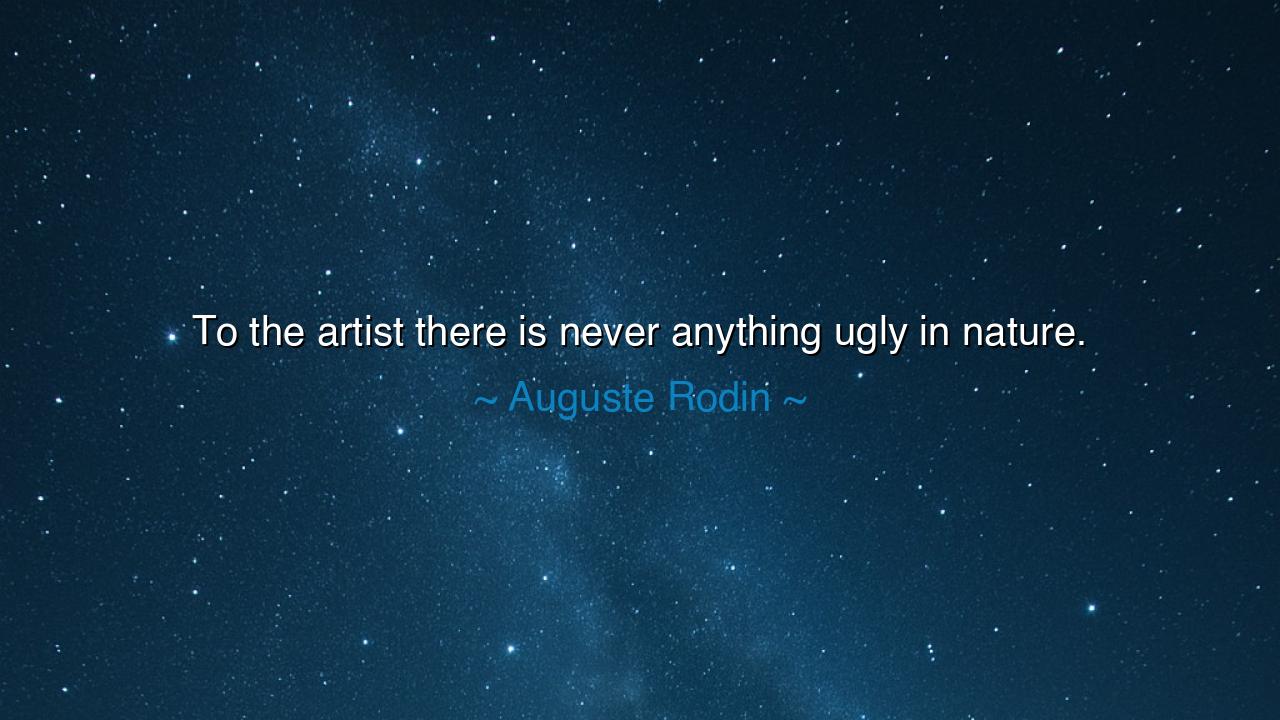
To the artist there is never anything ugly in nature.






Hearken, O children of vision and creation, to the profound insight of Auguste Rodin, whose sculptor’s eye revealed the hidden majesty of the world: “To the artist there is never anything ugly in nature.” In these words lies a meditation upon the power of perception, the transformative capacity of the human eye, and the eternal truth that all forms, when observed with understanding and sensitivity, carry beauty, meaning, and potential. Rodin teaches that what the world offers is never mere chaos or disorder, but a source of inspiration and wonder for those attuned to its rhythms.
The essence of this reflection is that beauty resides in perception. The untrained or unseeing eye may label a twisted branch, a cracked stone, or a stormy sky as repellent or ugly. Yet the artist perceives the interplay of form, line, and energy, understanding that every manifestation of nature carries aesthetic and spiritual significance. Rodin’s wisdom tells us that to see truly is to recognize harmony and potential, even where others perceive disorder.
Consider the life of Leonardo da Vinci, who studied the human body, the flight of birds, and the flow of water with unyielding attention. Even in decay, imbalance, or imperfection, Leonardo discerned structure, proportion, and the hidden beauty that guided both art and understanding. Like Rodin, he embraced the entirety of the natural world, seeing potential and majesty in forms that might appear flawed to the casual observer. Thus, the artist’s eye transforms perception into revelation.
The teaching also illuminates the virtue of mindful observation and patience. To perceive beauty in nature requires a careful, contemplative gaze, one that discerns patterns, contrasts, and subtleties. Rodin’s insight reminds us that judgment of ugliness is often the reflection of our own impatience or superficiality. True appreciation arises from attentiveness, engagement, and the willingness to perceive beyond surface appearances, uncovering the essence of form, energy, and life.
Even in modern life, this lesson endures. The urban landscape, the bustling streets, or the overlooked corners of the world may appear harsh or chaotic. Yet artists, poets, and visionaries—like Ansel Adams, who photographed the rugged landscapes of Yosemite—discover beauty in the stark, the weathered, and the irregular. Rodin’s insight applies broadly: the trained and attuned perception reveals harmony in what others dismiss, elevating even the ordinary to the extraordinary.
Rodin’s reflection also teaches the creative mind to see opportunity. For the artist, nothing in nature is wasted or meaningless; every branch, shadow, or ripple carries the potential to inform, inspire, or transform. By seeing without condemnation, the artist cultivates both vision and imagination, learning to translate raw observation into creation that communicates, evokes, and endures. The eye that perceives nothing as ugly becomes a conduit for expression and revelation.
O children of perception, take this teaching to heart: behold the world with eyes that discern beauty in all forms, from the grand to the humble, the ordered to the chaotic. Observe patiently, cultivate sensitivity, and allow the hidden harmonies of nature to awaken insight and inspiration. Let the sculptor’s eye guide you, revealing that the world, in its infinite variety, is never devoid of wonder, pattern, or grace.
Thus, let the words of Auguste Rodin illuminate your vision: to the artist, there is no ugliness, only form, rhythm, and potential. Cultivate perception, nurture appreciation, and allow every aspect of the natural world to inspire creation and reflection. In this vision, the ordinary becomes sacred, the flawed becomes instructive, and the soul learns to behold all existence as a tapestry of infinite beauty.
If you wish, I can also create a practical guide for cultivating the artist’s eye, inspired by Rodin’s reflection, with exercises for seeing beauty in all aspects of nature and everyday life. Do you want me to do that?






AAdministratorAdministrator
Welcome, honored guests. Please leave a comment, we will respond soon